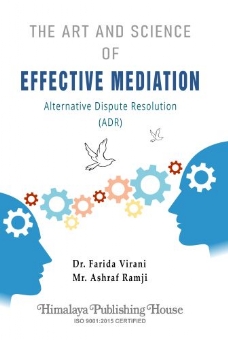The Art and Science of Effective Mediation
no information available
Mediation has been a part of conflict resolution in human relations since time immemorial and has evolved with civilizations. Mediation, as an ADR (Alternate Dispute Resolution) tool, is increasingly popular and widely used, even though the practice varies from one country to another mainly due to the cultural and legal differences existing in each jurisdiction. The process of mediation empowers self-determination while enabling the disputing parties an exceptional insight to each other's viewpoints. It is cost-effective, confidential, voluntary and less time-consuming as compared to other dispute resolution processes. The authors draw on their decade and a half of work in mediation training, practice, research and assessment to present a comprehensive account of what it takes to be an effective mediator. This edition offers an overview of the field of mediation by acknowledging that it is both a 'science' (the theory) and an 'art' (the practice). The absorbing insights in this book include: - an outline of the dispute resolution landscape in addition to the principles, phases and different styles of mediation. - a new and clearer presentation of the theory and practices providing a mediator's toolkit (questioning techniques, reading non-verbal body language, etc.), clarifying the various nuances and concepts of negotiation and revealing the use of subtle techniques of influence and persuasion during the mediation process. - a persuasive insight into research-based techniques on managing emotions, understanding the different frames (cognitive shortcuts) and learning the art of reframing in mediation. - a vivid picture of the various biases experienced during mediation and how to minimize them while also drawing upon the immense potential of apology and forgiveness in the mediation process. - a deeper dive in mediation through the prism of diversity, pluralism and cultural competence, while also understanding why some mediation fail or 'impasse' (deadlocks) occur (functional, emotional and process) and the strategies to deal with them along with some tips on how to reflect upon and learn from them. Ethics plays an important role in mediation. It works as a trust factor on which both the parties to a dispute rely. The concept of Mediator Ethics is discussed in this context. - a comprehensive personal guide on how to increase authentic gravitas invaluable for a mediator's success. The essentials of conducting successful online (virtual) mediation to help mediators align themselves with the changing times. This book is comprehensive, all-inclusive with references to the latest research findings and will be a treasure trove for amateurs just beginning their mediation careers as well as seasoned mediators who wish to sharpen their skills. The book can be successfully used for self-instruction and as a training manual for students, HR professionals and business leaders. Contents - 1. Dispute Resolution Landscape 2. Styles of Mediation 3. Procedures and Principles of Mediation 4. Phases of Mediation 5. A Mediator's Toolkit 6. Managing Emotions in Mediation 7. Influencing and Persuasion Techniques in Mediation 8. Negotiation Concepts and Skills 9. The Art of Framing and Reframing in Mediation 10. Overcoming Bias in Mediation 11. Mediation through the Prism of Diversity, Pluralism and Cultural Competence 12. Dealing with Deadlocks and Failed Mediation 13. The Power of Apology and Forgiveness 14. Developing a Confident Assertive Personal Mediator Presence 15. Mediator Ethics 16. Online Mediation Bibliography Appendix ... Read more Read less











